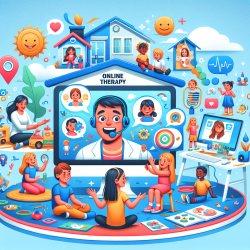As practitioners in the field of language therapy, we constantly seek effective methods to enhance the communication skills of our young clients. A recent study titled The Comprehension of Spatial Adjectives by Children with Normal and Children with Deviant Language Development provides valuable insights that can be directly applied to our practice. Conducted by David W. Illerbrun at the University of Saskatchewan, this study offers a comprehensive analysis of how children understand spatial adjectives and highlights key areas for improvement in language therapy.
In this blog, we will explore the significant findings of this research and how you can implement these insights to enhance your therapy sessions. Whether you are working with children who have normal language development or those with deviant language development, these strategies will help you support their comprehension of spatial adjectives.
Key Findings from the Research
The study examined the comprehension of six pairs of spatial adjectives in three different forms: polar, superlative, and comparative. The key findings include:
- Children found it significantly easier to comprehend polar and superlative forms compared to comparative forms.
- There was no significant difference in comprehension between children with normal language development and those with deviant language development when matched on mean length of utterance (MLU).
- Children did not show a preference for understanding unmarked (e.g., long, deep) versus marked (e.g., short, shallow) members of adjective pairs.
Implementing the Research in Your Practice
Here are some practical steps to incorporate these findings into your therapy sessions:
1. Focus on Polar and Superlative Forms
Given that children find polar and superlative forms easier to understand, start with these forms before introducing comparative forms. For example, use adjectives like "tall" and "tallest" before moving on to "taller."
2. Use Visual Aids
The study utilized simple black and white line drawings to represent spatial adjectives. Incorporate similar visual aids in your sessions to help children better understand the adjectives being taught. Visual aids can make abstract concepts more concrete and easier to grasp.
3. Match on Mean Length of Utterance (MLU)
When working with children with deviant language development, match them with peers of similar MLU rather than chronological age or IQ. This approach ensures that your interventions are appropriately targeted to their linguistic capabilities.
4. Practice Both Marked and Unmarked Adjectives
Since the study found no significant difference in the comprehension of marked versus unmarked adjectives, ensure that you practice both types equally. This balanced approach will help children become proficient in understanding a wide range of spatial adjectives.
Encouraging Further Research
While this study provides valuable insights, it also highlights the need for further research in the field of language development. Consider conducting your own mini-studies or collaborating with researchers to explore additional aspects of spatial adjective comprehension. This continuous cycle of research and application will contribute to the overall improvement of language therapy practices.
To read the original research paper, please follow this link: The Comprehension of Spatial Adjectives by Children with Normal and Children with Deviant Language Development.










